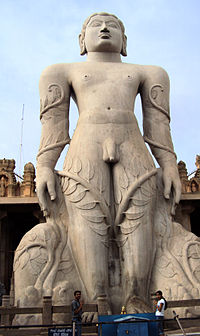
Renunciation (or renouncing) is the act of rejecting something, particularly something that the renunciant has previously enjoyed or endorsed.
In religion, renunciation often indicates an abandonment of pursuit of material comforts, in the interests of achieving Enlightenment, Liberation, or Kevala Jnana, for example as practiced in Buddhism, Hinduism, and Jainism respectively. In Hinduism, the renounced order of life is sannyāsa; in Buddhism, the Pali word for "renunciation" is nekkhamma, conveying more specifically "giving up the world and leading a holy life" or "freedom from lust, craving and desires".[1] (See also sangha, bhikkhu, bhikkhuni, and śramaṇa.) In Christianity, some denominations have a tradition of renunciation of the Devil.
Renunciation of citizenship is the formal process by which a person voluntarily relinquishes the status of citizen of a specific country. A person can also renounce property, as when a person submits a disclaimer of interest in property that has been left to them in a will.
- ^ Rhys Davids, T.W.; Stede, William (1952) [1921]. The Pali Text Society's Pali-English Dictionary. Vol. I(A). London: The Pali Text Society. p. 213. Rhys Davids & Stede speculate that the Sanskrit term with which nekkhamma is associated is either:
- naiṣkramya
- "inactivity, abstinence or exemption from acts and their consequences" (Monier Williams, Monier (1964). "Naish". Sanskrit-English Dictionary. p. 570.)
- naiṣkāmya
- "suppression of desire, profound contemplation" (ibid)
© MMXXIII Rich X Search. We shall prevail. All rights reserved. Rich X Search
